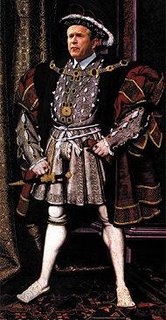King George: Use of bill signing statements lets Bush ignore laws

When President Bush recently signed a provision banning the use of torture by the United States, he attached an interesting statement to that signing. He wrote, in part, "The executive branch shall construe [the law] in a manner consistent with the constitutional authority of the President . . . as Commander in Chief...(and) will assist in achieving the shared objective of the Congress and the President . . . of protecting the American people from further terrorist attacks."
This written statement that accompanied the bill's signing is known as a "signing statement". Normally such statements might not garner much attention beyond the Capitol's inner circle, except for the fact that President Bush has an unusual affinity for such statements. In fact, he likes them so much that he has issued them with alarming frequency: over 500 times!
Experts say he has been far more aggressive than any previous president in using the statements to claim sweeping executive power - and not just on national security issues.
"It's nothing short of breath-taking," said Phillip Cooper, a professor of public administration at Portland State University. "In every case, the White House has interpreted presidential authority as broadly as possible, interpreted legislative authority as narrowly as possible, and pre-empted the judiciary."
Signing statements don't have the force of law, but they can influence judicial interpretations of a statute. They also send a powerful signal to executive branch agencies on how the White House wants them to implement new federal laws.
After Bush issued a signing statement on the provision banning torture, many interpreted it to mean that he essentially would do as he pleases in the name of national security. And, increasingly, one wonders if the President has any intention whatsoever of following the ban on torture.
In effect, Bush is thumbing his nose at the Congress, the legislative process and the Constitution by saying that HE will decide what to do and when to do it, regardless of the law. This approach sounds suspiciously similar to his position on the Foreign Intelligence Surveillance Act (FISA), which he chose to ignore in authorizing the NSA to conduct electronic surveillance without the required court-issued warrants.
"They don't like some of the things Congress has done so they assert the power to ignore it," said Martin Lederman, a visiting professor at the Georgetown University Law Center. "The categorical nature of their opposition is unprecedented and alarming."
The White House says its authority stems from the Constitution, but dissenters say that view ignores the Constitution's careful balance of powers between branches of government.
"We know the textbook story of how government works. Essentially what this has done is attempt to upset that," said Christopher Kelley, a presidential scholar at Miami University in Oxford, Ohio, who generally shares Bush's expansive view of executive authority. "These are directives to executive branch agencies saying that whenever something requires interpretation, you should interpret it the way the president wants you to."
This assumption of near-absolute power by the executive branch falls nicely in line with Vice President Dick Cheney's long-held belief - and desire - that the President should wield much greater power than the legislative or judicial branches of government. Clearly, President Bush is not holding back as he uses his "war on terror" to legitimize his unprecedented power grab.
The roots of Bush's approach go back to the Ford administration, when Dick Cheney, then serving as White House chief of staff, chafed at legislative limits placed on the executive branch in the aftermath of the Watergate scandal and other abuses of power by President Nixon. Now the vice president and his top aide, David Addington, are taking the lead in trying to tip the balance of power away from Congress and back to the president.
Have Presidents used such signing statements in the past? Yes, they have. But President Bush seems intent on being outdone by no other President in recent history. Presidents Reagan, Bush (Sr.) and Clinton invoked signing statements 71, 146 and 105 times, respectively. And Reagan and Clinton served eight full years in the White House. The current President, in comparison, has done so over 500 times in five years.
Some in Congress - on both sides of the aisle - clearly are concerned that this President has gone too far.
"He issues a signing statement that says he retains all of the inherent power that will permit him to go out and torture just the way they've gone ahead and tortured before," said Sen. Edward Kennedy, D-Mass. "That process is an arrogance of power."
"He can say whatever he likes, I don't know if that has a whole lot of impact on the statute. Statutes are traditionally a matter of congressional intent," said Sen. Arlen Specter, R-Pa., the chairman of the Senate Judiciary Committee.
So, if Congress is so concerned, then why haven't they done something about it? Well, as it turns out, they attempted to address this issue over two years ago. But a funny little thing happened along the way.
In 2003, lawmakers tried to get a handle on Bush's use of signing statements by passing a Justice Department spending bill that required the department to inform Congress whenever the administration decided to ignore a legislative provision on constitutional grounds.
Bush signed the bill, but issued a statement asserting his right to ignore the notification requirement.
This President is out of control.



0 Comments:
Post a Comment
<< Home